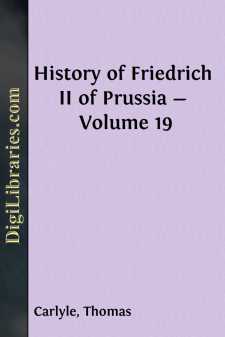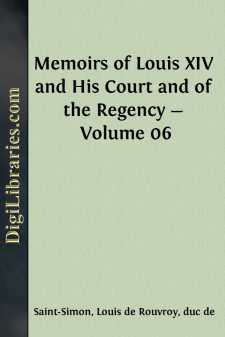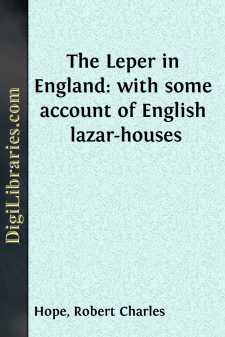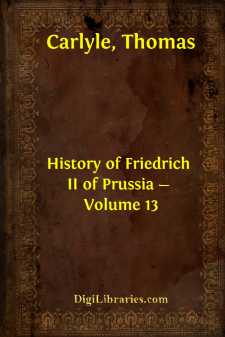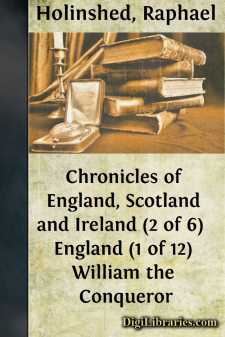History
- Africa 30
- Americas (North Central South West Indies) 50
- Ancient 68
- Asia 58
- Australia & New Zealand 8
- Canada 41
- Caribbean & West Indies 1
- Civilization 20
- Eastern Europe 12
- Europe
- Expeditions & Discoveries 60
- General 77
- Historical Geography 1
- Jewish 9
- Latin America 3
- Medieval 8
- Middle East 13
- Military 248
- Revolutionary 8
- Study & Teaching 5
- United States 353
- Western Europe 56
- World 13
Europe Books
Sort by:
by:
Thomas Carlyle
Chapter I.—PRELIMINARIES TO A FOURTH CAMPAIGN. The posting of the Five Armies this Winter—Five of them in Germany, not counting the Russians, who have vanished to Cimmeria over the horizon, for their months of rest—is something wonderful, and strikes the picturesque imagination. Such a Chain of Posts, for length, if for nothing else! From the centre of Bohemia eastward, Daun's Austrians are...
more...
I went this summer to Forges, to try, by means of the waters there, to get rid of a tertian fever that quinquina only suspended. While there I heard of a new enterprise on the part of the Princes of the blood, who, in the discredit in which the King held them, profited without measure by his desire for the grandeur of the illegitimate children, to acquire new advantages which were suffered because the...
more...
There is perhaps no subject of greater interest, nor one which awakens more sympathy, than that of the Leper; it affords a most curious, though painful topic of enquiry, particularly in the present day, when so much has been said and written, as to the probability and possibility of the loathsome scourge again obtaining a hold in this, our own country. Much confusion and ignorance exists, as to what...
more...
by:
E. Gordon Browne
CHAPTER I: A Look Back In the old legend of Rip Van Winkle with which the American writer Washington Irving has made us so familiar, the ne'er-do-weel Rip wanders off into the Kaatskill Mountains with his dog and gun in order to escape from his wife's scolding tongue. Here he meets the spectre crew of Captain Hudson, and, after partaking of their hospitality, falls into a deep sleep which...
more...
by:
Thomas Carlyle
Chapter I. — BRITANNIC MAJESTY AS PALADIN OF THE PRAGMATIC. Part, is now perhaps conceivable to readers. But as to the Second, the Germanic or Pragmatic Part,—articulate History, after much consideration, is content to renounce attempting these; feels that these will remain forever inconceivable to mankind in the now altered times. So small a gentleman; and he feels, dismally though with heroism,...
more...
Considering with my selfe, right Honorable and my singular good Lord, how redie (no doubt) manie will be to accuse me of vaine presumption, for enterprising to deale in this so weightie a worke, and so far aboue my reach to accomplish: I haue thought good to aduertise your Honour, by what occasion I was first induced to vndertake the same, although the cause that moued me thereto hath (in part) yer...
more...
THE FIRST CHAPTER. MULMUCIUS. Matth. West. Polyd. Now to proceede with the aforesaid authors, Mulmucius DunwallÐâ¦ÐÐ, or as other saie Dunuallo Mulmucius, the sonne of Cloton (as testifieth th'english chronicle and also Geffrey of Monmouth) got the vpper hand of the other dukes or rulers: and after his fathers deceasse began his reigne ouer the whole monarchie of Britaine, in the...
more...
by:
David Hume
The bishop of Valence, a prelate of the house of Savoy, and maternal uncle to the queen, was his chief minister, and employed every art to amass wealth for himself and his relations. Peter of Savoy, a brother of the same family, was invested in the honor of Richmond, and received the rich wardship of Earl Warrenne; Boniface of Savoy was promoted to the see of Canterbury: many young ladies were invited...
more...
by:
Justin McCarthy
CHAPTER I. "MORE, ALAS! THAN THE QUEEN'S LIFE!" "The Queen is pretty well," Swift wrote to Lord Peterborough on May 18, 1714, "at present, but the least disorder she has puts all in alarm." Swift goes on to tell his correspondent that "when it is over we act as if she were immortal; neither is it possible to persuade people to make any preparations against an evil...
more...
by:
Robert Black
CHAPTER XXIII.——THE HUNDRED YEARS' WAR—CHARLES VI. AND THE DUKES OF BURGUNDY. Sully, in his Memoirs, characterizes the reign of Charles VI. as "that reign so pregnant of sinister events, the grave of good laws and good morals in France." There is no exaggeration in these words; the sixteenth century with its St. Bartholomew and The League, the eighteenth with its reign of terror, and...
more...


